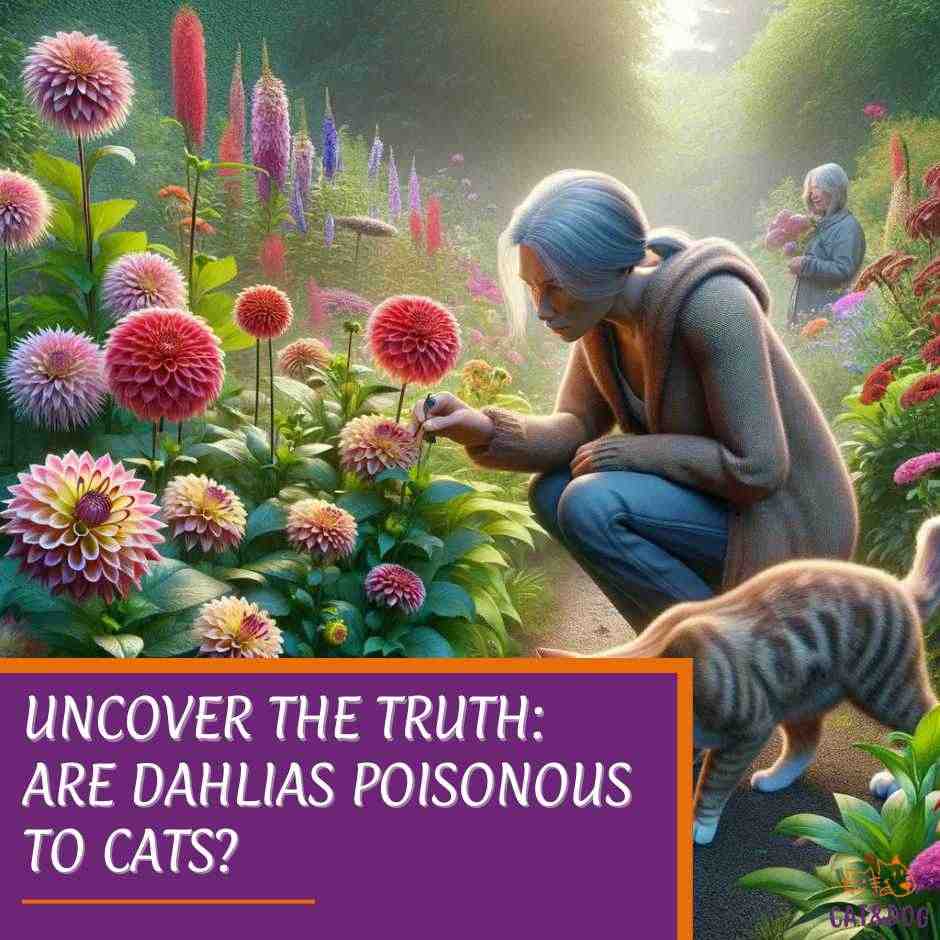Are dahlias poisonous to cats?
While safeguarding your garden from curious cats, remember that their natural hunting instincts, such as chasing moths, can also lead them to explore and potentially nibble on plants like dahlias, highlighting the importance of creating a safe and engaging environment for them both indoors and outdoors.
With their vivid blooms and myriad forms, have taken a prominent spot in gardens around the world.
Originating from the hills of Mexico, these flowering plants have enthralled gardeners and decorators alike with their stunning diversity and vibrant colors.
But if you’re a cat owner, your admiration could quickly turn to concern.
It’s natural to wonder: can your feline friends safely enjoy your garden, or does the presence of different dahlia varieties pose a hidden risk?
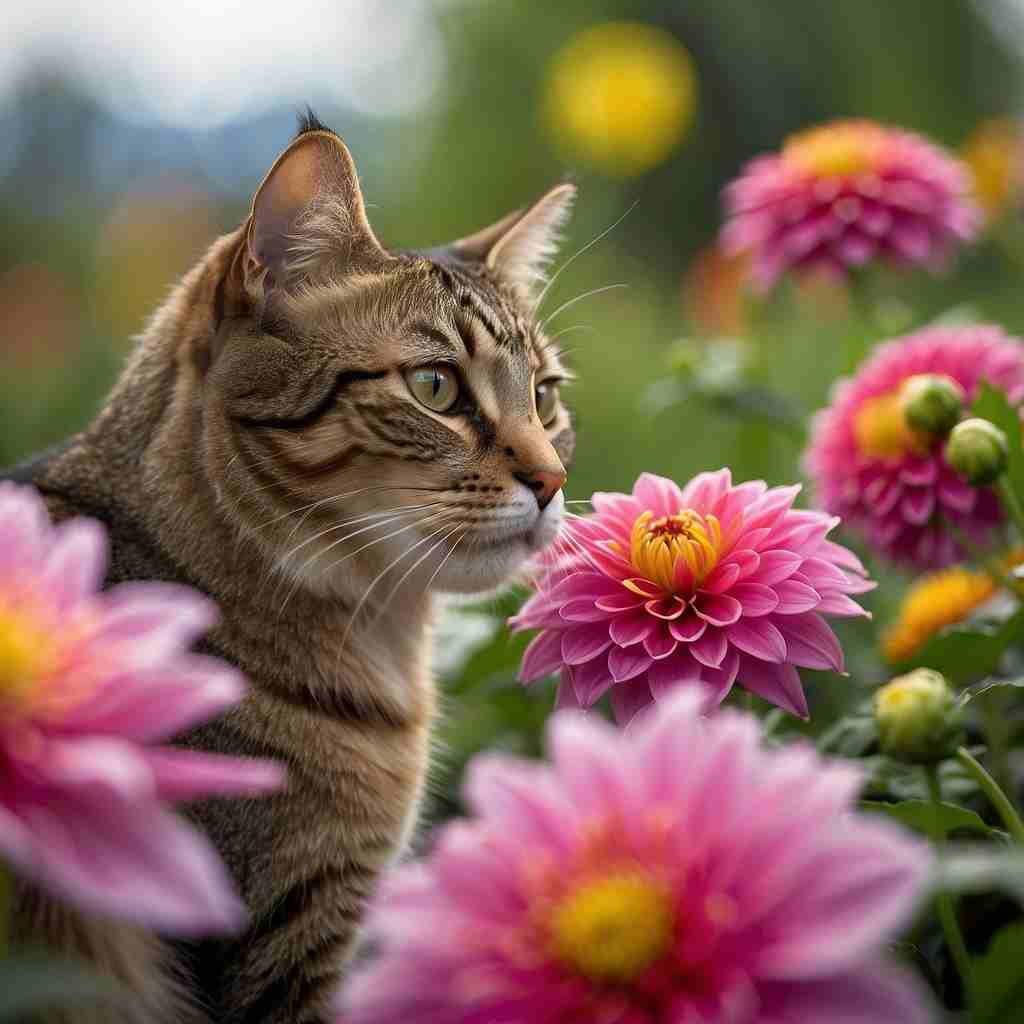
Navigating the world of plant toxicity might not be your idea of a good time, but it’s crucial when your curious kitties are involved.
The worry that accompanies the thought of your cat nibbling on potentially harmful plants is no small matter. Rest assured, the goal here is to cut through the confusion with expert-verified info.
We’ll explore whether dahlias are toxic to your beloved pets and what symptoms you should look out for, so you can be informed and prepared to keep your cat safe.
Key Takeaways
- Dahlias contain substances toxic to cats.
- Look for symptoms like gastrointestinal upset or dermatitis.
- Immediate vet consultation is advised if poisoning is suspected.
Are Dahlias Poisonous to Cats?
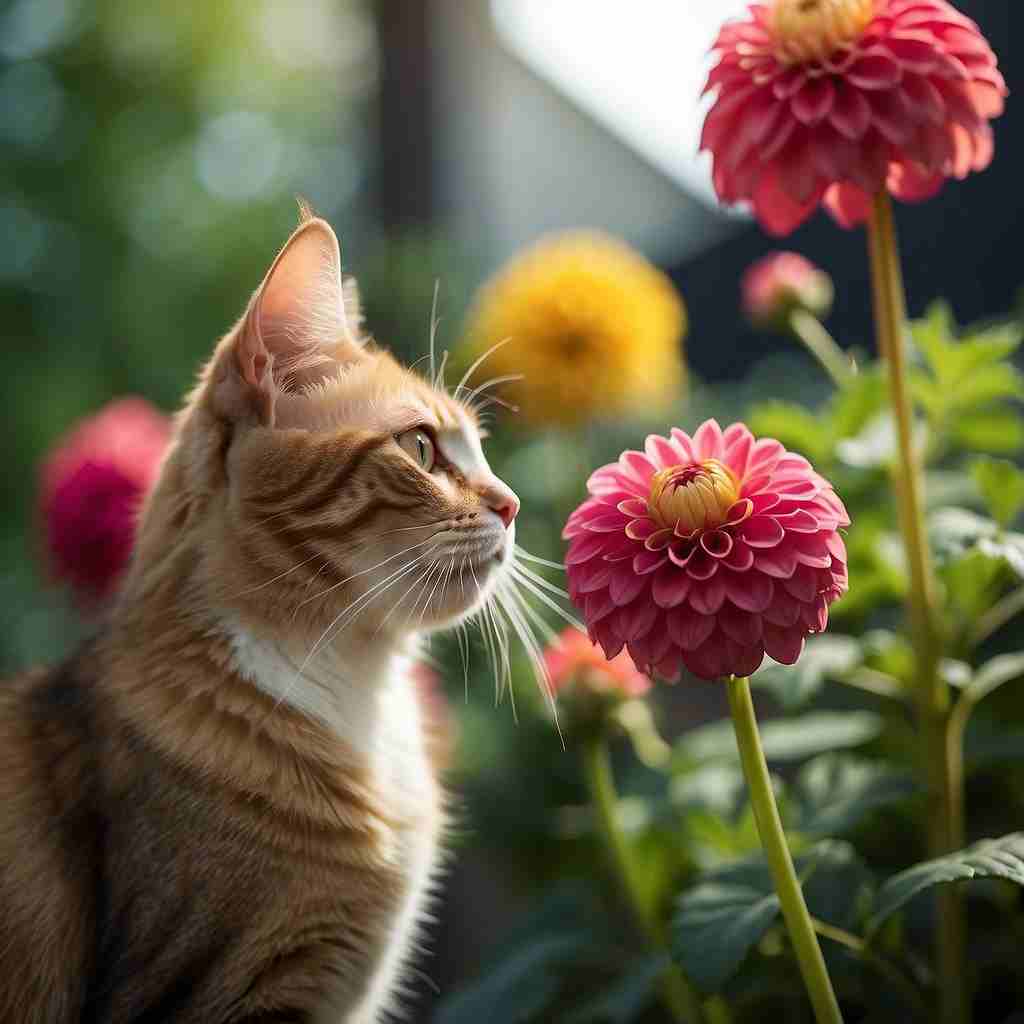
Have you ever caught your furry friend nibbling on the petals of your garden’s pride, the dahlia plant?
It’s important to know that dahlias are indeed mildly toxic to cats, and it’s crucial to understand the potential toxicity for pet owners.
The reason for this lies in the chemical makeup of the plant. Dahlias contain compounds that can cause a bit of a tummy upset in our feline companions, especially if they consume a large amount of plant matter.
So, what’s in those vibrant blooms that could give your cat a rough time? Well, while the exact toxic principles in dahlias remain a mystery, they can lead to mild gastrointestinal symptoms, such as:
In rare cases, exposure could also cause slight skin irritation, known as mild dermatitis. It’s quite the hassle for your purring pals, and certainly something to steer clear of.
“But how much of the dahlia is risky?” you might wonder. The entire plant is best kept out of reach of your cat, but the tuber – that bulb-like storage organ – is particularly troublesome.
If ingested by an overly curious cat, this part of the plant can lead to a toxic reaction.
Here’s what to watch out for if you suspect plant poisoning:
| Symptoms to Notice |
| Drooling |
| Vomiting |
| Diarrhea |
| Lethargy |
Remember, if you see any of these worrisome signs, reach out to your vet pronto.
And while not overly dramatic, it’s good cat-parenting to prevent such mischief by keeping those dahlias (and any questionable plants) safely away from your whiskered roommates.
Offering safer alternatives like cat grass can quench their grazing desires and keep those beautiful blooms just for your eyes.
However, if your cat does happen to ingest dahlia and experience symptoms of poisoning, rest assured that they will likely make a speedy recovery and be back to their old selves in just a few days as the toxins pass through their digestive tract.
While focusing on dahlias, it’s also wise for cat owners to educate themselves on other common household plants, such as understanding the toxicity of the Wandering Jew plant, to ensure a completely safe environment for their pets
Recognizing Symptoms of Poisoning in Cats
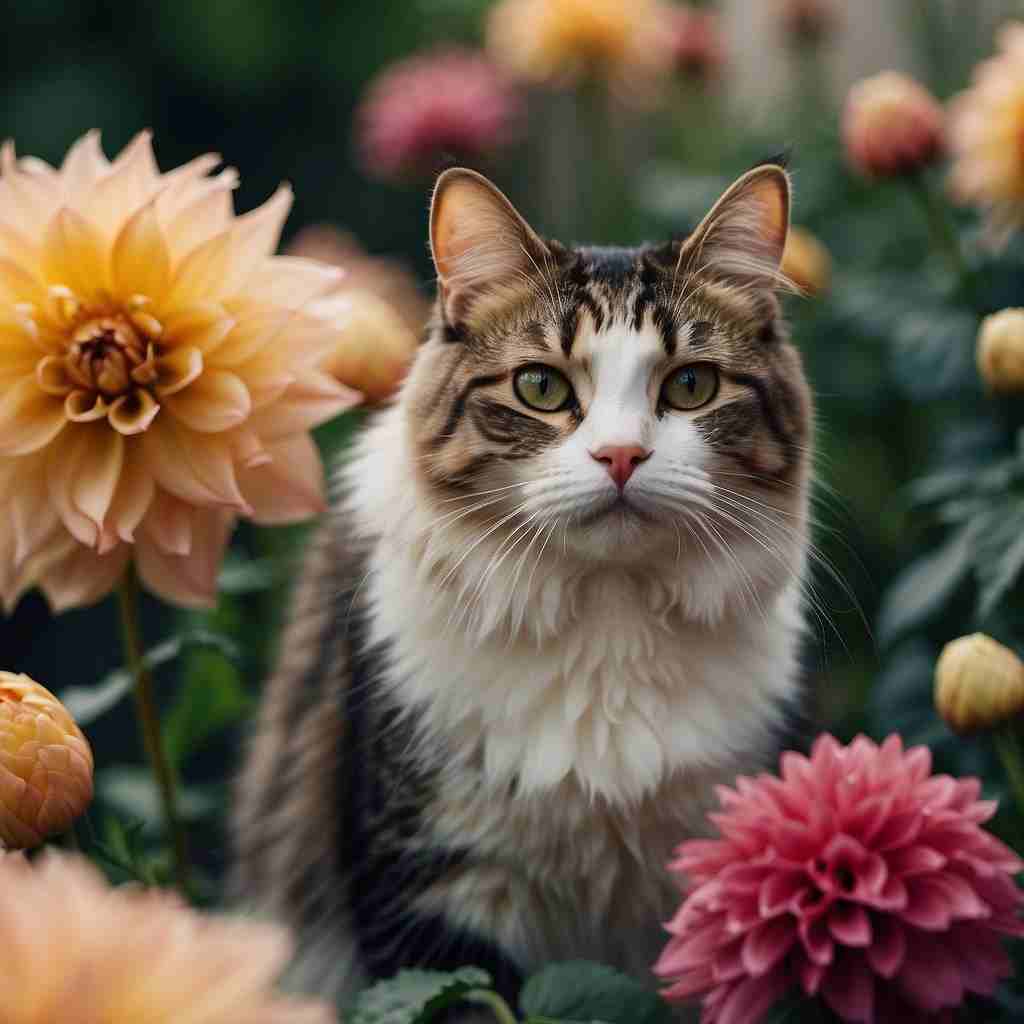
Have you ever seen your furry friend act oddly after exploring the garden? They might have gotten into something they shouldn’t have. Here’s what to watch for if you suspect poisoning:
- Vomiting: Is your cat making frequent trips to the litter box or heaving? That’s a red flag.
- Diarrhea: Keep an eye on their stool. Is it loose or different than normal?
- Lethargy: If they’re not their usual playful self and seem tired, take note. (4)
- Loss of Appetite: Are they turning their nose up at dinner? It could be a sign something is off.
Remember that cat who got into a houseplant and suddenly started acting tired and refused their meals? It turns out, the amount a cat ingests and their health play a part in how they react.
A nibble might only cause mild discomfort, but a feast could lead to a rush to the vet.
When to Seek Veterinary Care:
- Lethargy won’t shake off?
- Non-stop vomiting?
- A tummy upset that lasts longer than a day?
Time to ring your vet! They’re your go-to for handling these sneaky symptoms.
Your immediate actions can make all the difference.
If you catch your cat in the act, gently remove any plant remnants from their mouth. Keeping them calm can prevent additional stress, which helps in a situation like this.
A relaxed cat is easier to assess and treat, whether at home or on the vet’s exam table.
Spotting these symptoms early can be a game-changer, so keep your eyes peeled and your vet’s number handy. Your quick action could turn a potential cat-astrophe into a purr-fectly manageable situation.
Emergency Response and Treatment
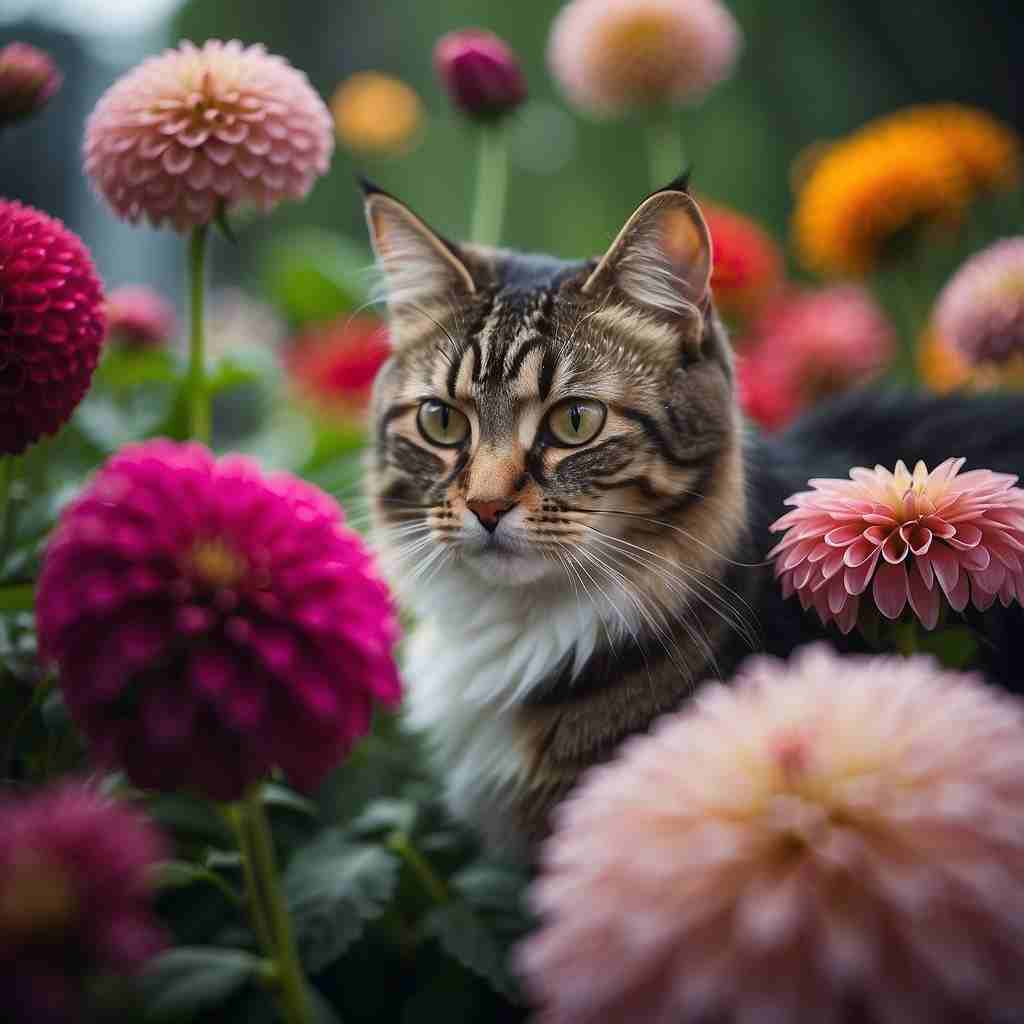
Hey there, fellow cat aficionado! Imagine you’ve just discovered your curious kitty nibbling on a dahlia flower—yikes! Here’s what you can do to keep the situation from blossoming into a real problem:
- Rinse It Out: Gently flush your cat’s mouth with water to wash away any plant remnants.
- No More Munchies: Keep those dahlias (and any other potentially harmful plants) out of reach.
Now, let’s talk about what comes next. Even if your feline friend seems fine, a quick call or visit to the vet is key. Here’s the drill for a typical veterinary response:
- Initial Assessment: Your vet will check vital signs and symptoms.
- Detox Route: They might administer activated charcoal to absorb toxins.
- Supportive Care: Fluid therapy and medications can help manage symptoms.
Remember, it’s su-purr important to consult a vet—no matter how mild the symptoms seem. It’s not just being overly cautious; it’s about keeping your whiskered companion safe.
Before you dash off to the vet, make sure to grab:
- Health History: Jot down any recent odd behaviors or dietary changes.
- Dahlia Details: Note the part of the plant your cat interacted with.
With this approach, you’re ensuring the best paw-sible outcome for your furry family member.
Plus, it gives you peace of mind, and we all know that’s priceless! Keep this info handy, and you’ll be ready to act fast—because when it comes to our pets, every moment counts. 🐾
Preventative Measures for Cat Owners
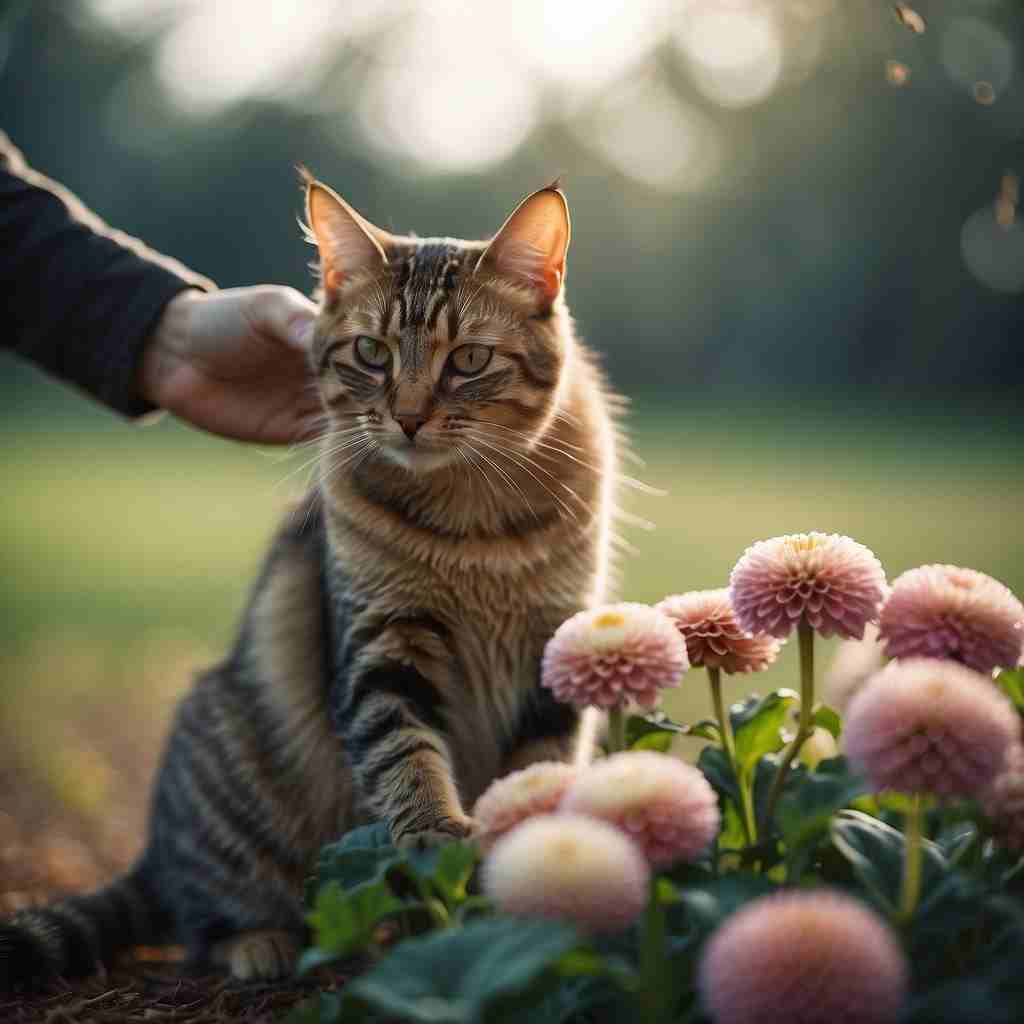
Create Physical Barriers
- Fences: A small fence around your dahlia garden can keep your cat at bay.
- Plant Cages: These can protect your blooms and deter your cat.
Cat Deterrents that Work
- Citrus Peels: Cats dislike the scent of citrus. Scatter some around your dahlias.
- Commercial Repellents: Various safe ones are available tailored for keeping cats out of your plants.
Identifying and Removing Harmful Plants
- Spot Check: Regularly inspect your indoor and outdoor spaces for toxic plants.
- Remove or Replace: If you identify a harmful plant, consider finding it a new home away from your fur baby.
Safe Alternatives for Your Garden
Aha, the fun part! Let’s talk about cat-safe plants:
- Spider Plant: Easy to grow and non-toxic.
- Cat Grass: Yes, it’s a thing, and yes, your cat will likely love it.
- Bamboo Palm: A touch of the tropics that’s safe for whiskers.
Creating a Cat-Friendly Garden
You’re looking to make a little green haven for both you and your kitty, right? Here’s what you need to do:
- Safe Plants: Check out the ASPCA’s list of non-toxic plants.
- Secure Garden Beds: Make sure your plants are safe from playful paws.
Now, armed with this knowledge, go create a floral paradise that you and your whiskered companion can enjoy worry-free!
Engaging and Informing the Reader
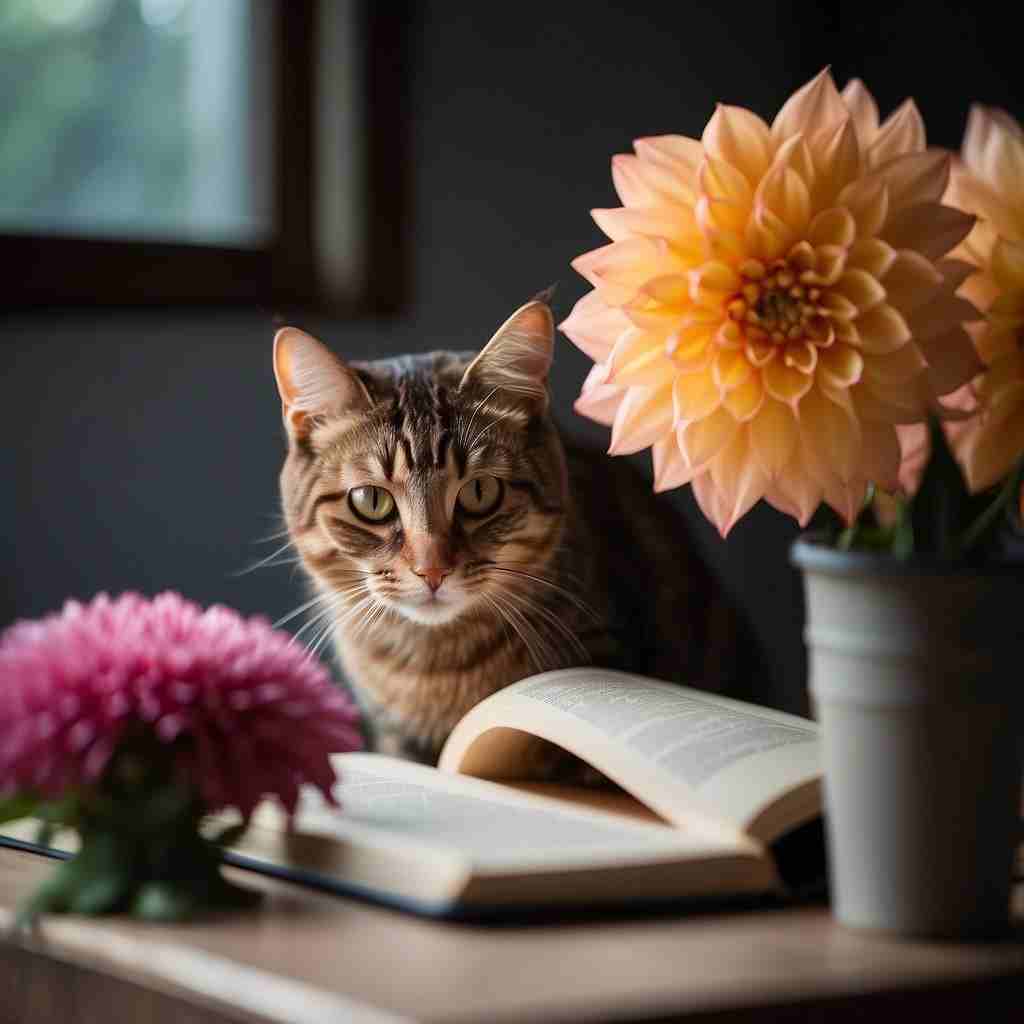
Toxic vs. Non-Toxic Plants for Cats: A Quick View
| Safe for Cats | Not Safe for Cats |
| Catnip | Dahlias |
| Spider Plant | Lilies |
| Bamboo | Tulips |
Got a feline friend at home? Knowing which plants are safe and which can cause trouble is pretty crucial.
Those lovely dahlias, for example, while they’re a feast for your eyes, they’re not so great for your kitty’s tummy.
What to Know About Dahlia Toxicity in Cats
- Symptoms: In case your cat decides to snack on some dahlia, they might experience vomiting, diarrhea, drooling, and a general sense of “I shouldn’t have eaten that.”
- Onset: How fast do symptoms show up? It can be pretty quick — typically within a couple of hours after ingestion.
- Long-term Health Effects: Are we talking about a long-term problem? Usually not. With proper care, your cat should bounce back.
Quick Q&A
- Can my other pets be affected? Yes, dahlias are also toxic to dogs and horses.
- What should I do if they eat a dahlia? Act swiftly! Get in touch with your vet or call the pet poison helpline.
Remember, cats are curious by nature, and an unattended dahlia might just be too tempting.
It’s better to be safe and keep those blooms out of reach. Keep those whiskers twitching safely by choosing cat-friendly foliage! 🌱🐾
Quick Recap
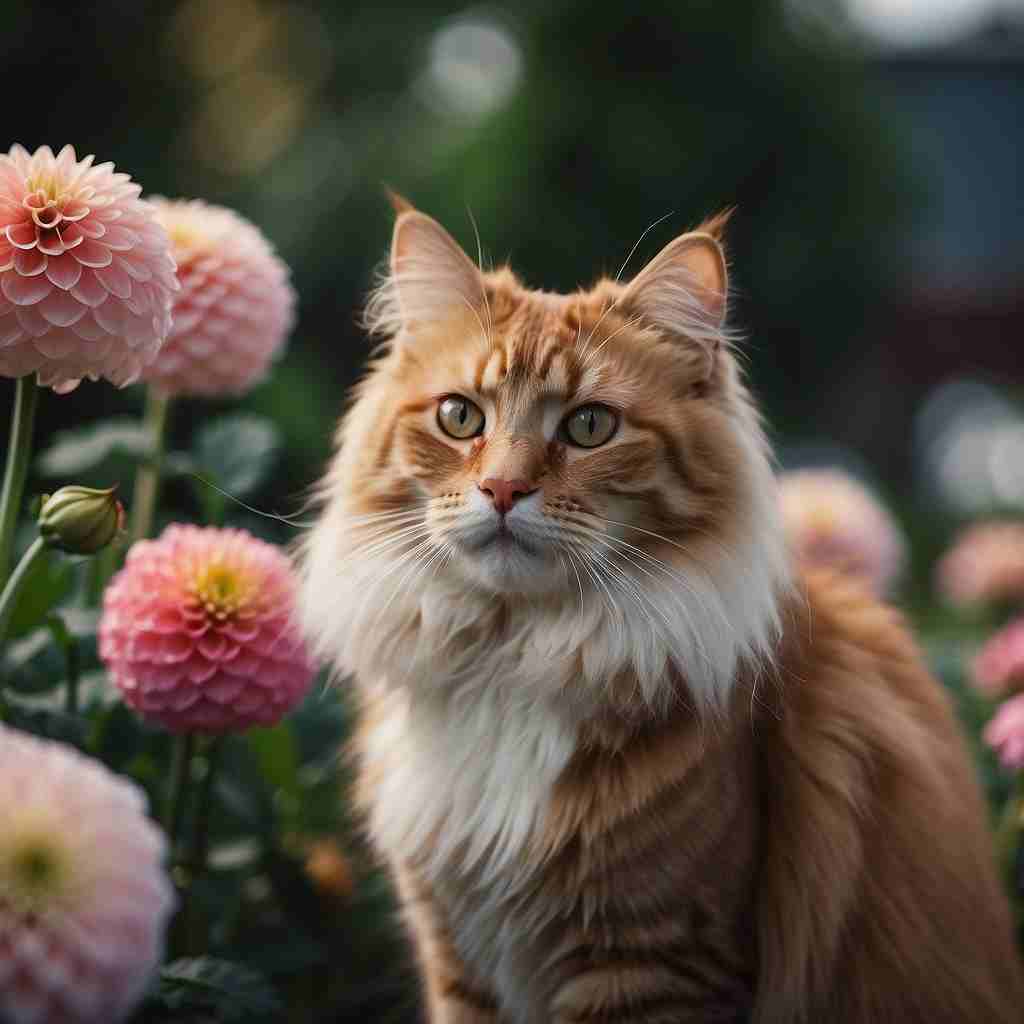
Let’s put our detective hats on and sleuth out the truth. Are your colorful dahlias a friend or foe to your furry feline companion? Here’s the scoop:
- Toxicity Level: While sources differ, some say that dahlias are non-toxic, as per the ASPCA. Others note they can be harmful. The verdict? Proceed with caution. (5)
- Symptoms: If your cat chews on a dahlia, watch out for signs like vomiting or diarrhea. These symptoms indicate it’s time for a vet visit.
- Emergency Response: Cat got into the dahlias? Contact your vet immediately. Quick action is key.
Maybe consider non-toxic alternatives for peace of mind. Roses or Gerbera daisies, perhaps? And hey, why not treat your kitty to some safe catnip instead? Trust me, they’ll be purring in gratitude.
Keep those vibrant beauties up high, or maybe just in a cat-proof garden. Your cat will thank you with extra cuddles and fewer trips to the vet!
Remember:
- Dahlia’s toxicity is debatable—better safe than sorry.
- Watch for upset tummies if your cat nibbles on plants.
- Quick vet attention can save the day.
Your cat’s well-being is worth more than any flower. So, keep those petals at a paw’s distance, and let’s keep our feline friends both happy and healthy!
Frequently Asked Questions
In this go-to guide for cat lovers, you’ll discover not only how to react if your feline friend nibbles on a dahlia, but also tips on creating a safe, pet-friendly garden.
Let’s jump right in and tackle your most pressing questions about dahlias and your whiskered companions!
What immediate first aid should I give my cat if it ingested a dahlia?
If you catch your cat munching on a dahlia, don’t panic.
Gently remove any plant material from their mouth and offer fresh water. Watch for any unusual behavior and contact your vet promptly for specific advice.
What plants should I keep in my cat-friendly garden?
Your garden can still be a blooming haven for you and your cat.
Consider planting catnip, catmint, or cat grass, which are safe and might just make your kitty’s day.
Remember to always double-check the safety of plants before adding them to your pet’s playground.
Are dahlia leaves or flowers more toxic to cats?
Both the leaves and flowers of dahlias can cause trouble.
But it’s typically the ingestion of the flower that leads to more noticeable symptoms of gastrointestinal distress in cats.
Keep an eye on both, to ensure your pet’s safety.
What are the risks of my cat just smelling or touching dahlias?
Good news: smelling dahlias isn’t known to be harmful to cats.
However, touching these plants can sometimes cause minor skin irritation, so it’s best to keep them out of reach to avoid any potential issues.
Can cats recover fully from dahlia poisoning?
Yes, with prompt treatment and care, cats can recover fully from dahlia poisoning.
Keep an eye out for any signs of illness and work closely with your vet for the best recovery plan.
How can I safely keep dahlias in my home without endangering my cat?
To safely keep dahlias in your home, consider placing them in a cat-proof area or hanging them high where curious paws can’t reach.
Alternatively, choose artificial dahlias to eliminate any risk and still enjoy their beauty.
- How to Perform at an Online Casino - July 7, 2025
- Free Slots With Bonus and Free Spins - July 6, 2025

